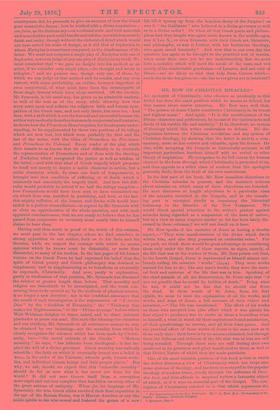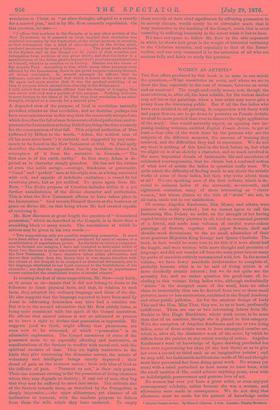MR. ROW ON CHRISTIAN MIRACLES.* AN apologist of Christianity, who
chooses as prudently as this writer has done the exact position which he means to defend, for that reason alone merits attention. Mr. Row says well that, "The person of Jesus Christ constitutes Christianity in its truest and highest sense." And again, "It is the manifestation of the Divine character and perfections, by means of the various acts and deeds of his earthly life and ministry." It is, therefore, no systeim of theology which this writer undertakes to defend. He dis- tinguishes between the Christian revelation and any system of Christian theology, by showing that the latter is merely a com- mentary, more or less correct and valuable, upon the former. He also, while accepting the Gospels as historically accurate in al/ important particulars, burdens himself with no verbal or other theory of inspiration. He recognises to its full extent the human element in the form through which Christianity is presented to us, and thus appeals to a wider class of readers than the apologist generally finds, from the fault of his own narrowness.
In the first part of his book, Mr. Row considers objections to. the Christian miracles in general, and the incorrect notion& about miracles on which many of these objections are founded.
He next discusses at length objections to a particular class of the miracles recorded in the Gospels, and in the remain- ing part is occupied chiefly in examining the historical testimony to the Miracles of the New Testament. We would direct special attention to the writer's protest against miracles being regarded as a suspension of the laws of nature, but as a view in many respects similar to his has been lately dis- cussed in these columns,f we will not dwell on it here.
Mr. Row speaks of the miracles of Jesus as having a double
aspect,—" They were manifestations of the divine which dwelt within him, and also they possessed an evidential value." For- our part, we think there would be great advantage in considering them only under the first of these aspects, as signs, namely, of the life that was in the worker of them. Mr. Row points out that, in the fourth Gospel, Jesus is represented as himself almost uni- formly calling his miracles "works" (Ipya). They were works natural for him to do ; like any man's works, they were the natu- ral fruit and outcome of the life that was in him. Speaking of the chief miracle of all, the Resurrection, St. Peter says that "it was not possible that he could be holden of death." Being what he was, it could not be but that he should rise from, the dead. In these words of St. John, from his first epistle, we seem to have the explanation of all the works, and' words, and ways of Jesus, a full account of their object and intention,—" The life was manifested." The effect of his works on those who accepted him (the effect which it was plainly his first object to produce) was to excite in them a boundless trust in himself, a trust in which all their aspirations found satisfaction, all their questionings an answer, and all their fears peace. And the practical effect of these works of Jesus is the same now as in those early days ; their force is by no means exhausted, but through them the fullness and richness of the life that was in him are still being revealed. Through them men are still finding their own manhood in its greatness and glory manifested to them, as well as- that Divine Nature of which they are made partakers.
One of the most valuable portions of this book is that in which the writer discusses a view of Christianity which has crept into' some systems of theology, and has been stereotyped in the popular theology of modern times, chiefly through the influence of Para- dise Lost, and thus affords to sceptical writers a favourite object of attack, as if it were an essential part of the Gospel. The con- ception of Christianity referred to is that which represents the * The Supernatural In the Nete Teitantent. By C. A. How, M.A., Prebendary of SL Peas. London : Frederic Nonaae.
f spectator, May 6.
revelation in Christ as "an after-thought, adopted as a remedy for a marred plan," and is by Mr. Row earnestly repudiated. On this question, he says:—
" I affirm that nowhere in the Gospels, or in any other portion of the New Testament, is it asserted or even implied that revelation was rendered necessary by the frustration of the divine purpose in creation, or that redemption was a kind of after-thought in the divine mind, rendered necessary by such a failure The great truth set forth in the Epistle and in the Gospel (of St. John) is that creation and redemption form portions of one great whole, and that the latter is a manifestation of the divine glories beyond God's previous manifestations of himself, whether in creation or in history. Similar are the views of the Apostle Paul. According to him, while many other purposes wore effected by the Incarnation, there is one great purpose running through all divine revelation. In several passages he affirms that its
influence extends far beyond that which it exerts on the race of man He again and again asserts that it was the gradual unfolding of an idea or purpose which existed from eternity in the divine mind I fully admit that the Apostle affirms that the design of bringing Man into union with God was a portion of this purpose. Nothing, however, is more foreign to the ideas of St. Paul than that revelation is an after- thought, adopted as a remedy for a marred plan."
A degraded view of the purpose of God in revelation naturally provokes attacks on that revelation, and no doctrine perhaps has been more mischievous in this way than the commonly accepted one
which describes the fall of man from a state of ideal perfection, and re- presents the Incarnation as being littleif anything else than a remedy for the consequences of that fall. This original perfection of Man (affirmed by Milton in the words, "Adam, the noblest man of
all his sons since born ") is certainly not suggested by any state- ments to be found in the New Testament or Old. St. Paul aptly describes the character of Adam, having doubtless formed his
conception of it from the narrative in Genesis,—" The first man is of the earth, earthy." In that story, Adam is de- picted as in character simply graceless. He has not the virtues of even the noble savage,—courage, frankness, or generosity.
" Good" and " perfect " man at his origin was, as a being untainted with evil, and capable of indefinite exaltation ; a vessel fit for receiving grace, but as yet unfilled. To quote again from Mr.
Row, "The divine purpose of Creation includes within it a yet further manifestation of the divine character and perfections.
This is what the New Testament affirms to have taken place in the Incarnation." God reveals Himself therein as the bestower of grace on divine life, on that being whom He had created capable of receiving it.
Mr. Row discusses at great length the question of " demoniacal possession," which as described in the Gospels, is in those days a stumbling block to many minds. The conclusions at which he arrives may be given in his own words :—
" Two suppositions only are possible respecting possession. It must have been either a form of madness produced by natural causes, or a manifestation of superhuman power. As the facts on which a judgment can be formed are meagre, I have not ventured to determine which of these two theories is alone consistent with the facts and phenomena of the New Testament. I have therefore taken either alternative, and shown that neither does the theory that it was mania interfere with the claims of the Gospels to be accepted as historical documents, nor is the language attributed to our Lord contrary to the truthfulness of his character ; nor does the supposition that it was due to superhuman -causes contradict the established truths of mental science."
In treating the first of these suppositions, Mr. Row—very fairly, as it seems to us—insists that it did not belong to Jesus or his followers to teach physical facts, and that, in relation to such facts, they adopted the ordinary language and ideas of the day. He also suggests that the language reported to have been used by Jesus in addressing demoniacs may have had a curative use. But it is to the second alternative that Mr. Row plainly leans, as being more consistent with the spirit of the Gospel narratives. He affirms that mental science is not so advanced at present as to have a right to declare that possession is impossible. He suggests (and we think, might affirm) that phenomena are even now to be witnessed, of which "possession" is an admissible explanation. The Gospel narratives of cures of the possessed seem to us especially affecting and instructive, as manifestations of the Saviour in conflict with moral evil, with the spiritual enemies of man. They are highly instructive in the hints they give concerning the demoniac nature, the nature of -voluntary and intelligent beings utterly depraved ; their dread of pain as the sttmmum malum ; their sole idea of God as the inflicter of pain. "Torment us not," is their only prayer. Their one constant craving is for the possession of living creatures 'whom they may degrade or destroy ; if cast out of men, they beg that they may be suffered to enter into swine. The attitude also of the Saviour towards them, as described by the Evangelists, is deeply impressive ;—the utter abhorrence, yet absence of all inclination to torment, with the resolute purpose to deliver from them the wills which they have enslaved. To empty
these records of their chief significance by affirming possession to be merely disease, would surely be to surrender much that is very instructive in the teaching of the Gospel, much that is most consoling to suffering humanity in the sorest trials it has to bear.
We have not space to follow Mr. Row in the able argument in which he shows how great is the weight of historical testimony to the Christian miracles, and especially to that of the Resur- rection, and can only commend it to the attention of all who are anxious fully and fairly to study the question.



































 Previous page
Previous page